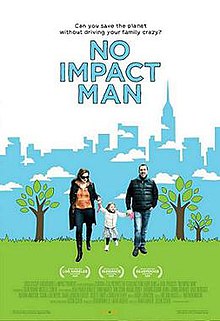Last night Chris and I sat down and watched No Impact Man , a fascinating documentary about Colin Beavan and his family who, in the midst of the chaos of New York City, decided to revolutionize their lifestyle and eliminate their environmental impact for one year. They gave up everything from using toilet paper to riding escalators, set up a compost bucket in their apartment, and eventually stopped using household electricity (which meant no refrigerator, television, or lights). The Beavan family used their individual power to challenge systems of unsustainability and to inspire greater collective action.
, a fascinating documentary about Colin Beavan and his family who, in the midst of the chaos of New York City, decided to revolutionize their lifestyle and eliminate their environmental impact for one year. They gave up everything from using toilet paper to riding escalators, set up a compost bucket in their apartment, and eventually stopped using household electricity (which meant no refrigerator, television, or lights). The Beavan family used their individual power to challenge systems of unsustainability and to inspire greater collective action.
What's fascinating about Colin's project is that in the process of lessening his impact on the environment, he drastically improved his own life. He ate healthier by eating fresh, local (non processed) food and he was able to spend more quality time with his family by eliminating most digital technology from his household. He saved his family a substantial amount of money by reducing uneccesary purchases and buying used goods instead of new goods.
However, Colin also faced severe criticism. Some claimed he was doing the project for fame and fortune (he wrote a book
Colin was contributing to the dialogue in green living and using his individual power to create change. The purpose of the book and documentary was to inspire collective action. As he says, "The fact of the matter is that if only I change, it's not going to make a difference, but the hope is that if each of us as individuals change, it's going to inspire everybody to change. So I believe the most radical political act there is, is to be an optimist. The most radical political act there is, is to believe that if I change, other people will follow suit."
It will take decades to revolutionalize corporate and political institutions for the maximum benefit of the environment. However, as Vaclav Smil said, "There is no faster, easier fix for America's energy crisis than to simply begin living with rational limits." We can't wait for the system to change, we must change it ourselves by thinking globally and acting locally.
Since watching the film, Chris and I have talked about committing a week to the No Impact Project this January. Although it wasn't directly addressed in the movie we've also considered eliminating high fructose corn syrup from our diets because of the disaster it reeks on your health (obesity), the economy (corn subsidies), and the environment (food processing). We also hope to have a Green Christmas by wrapping our Christmas packages with recycled materials like newspapers or paper bags and purchasing mostly eco-friendly and fair trade items.
For more information on the No Impact Experiment and a trailer from the movie, check out this video.
For more information on the No Impact Experiment and a trailer from the movie, check out this video.
